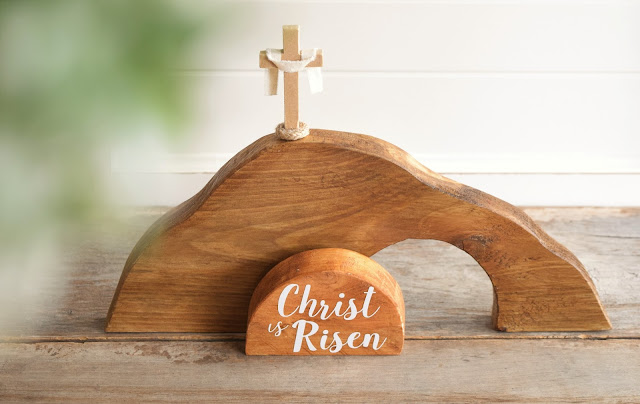“For as by a man came death, by a man has come also the resurrection of the dead. For as in Adam all die, so also in Christ shall all be made alive.” (1 Corinthians 15:21-22)The curse for sin was death (Gen. 2:17). Death and corruption is not natural. Man was not made to die. God created man as a unity of body and soul. His body was just as much him as his soul. Death was the curse threatened for breaking God’s covenant. Death came upon Adam and his race as a curse for sin. Mankind was condemned to death. This included more than physical death, but not less. The earth’s bondage to corruption was imposed as a curse (Rom. 8:20-21), and man was sentenced to return to the dust: “By the sweat of your face you shall eat bread, till you return to the ground, for out of it you were taken; for you are dust, and to dust you shall return” (Genesis 3:19).
Jesus took on human nature, body and soul, to redeem us from this curse. The sins of his people were pinned on Jesus and he was cursed for them, partaking of their flesh and blood so that he might receive this condemnation and penalty. If Christ’s body was not raised, then the curse was not lifted and you are still in your sins.
But his bodily resurrection showed that the debt had been paid and the curse lifted. The resurrection was Christ’s justification, his declaration of righteousness from his Father. The power of death was broken. The pangs of death had been loosed. The keys to death and Hades had been obtained. The devil had been bound and his head crushed. And Jesus won this victory not only for himself, but for all his people. Just as Adam’s race fell in him, so the brethren of Christ were raised with him to justification, new life, and the hope of resurrection.
There is no condemnation upon Christ and his people, but rather justification, and therefore, resurrection. Because the sting and power of death, sin and condemnation, has been taken away, death will not be able to hold the believe when Christ calls him. Because of Christ’s death and resurrection, the saints are justified as they receive Christ by faith and their moral bodies shall be raised immortal at Christ’s coming.
Even as death and corruption came through Adam, so resurrection and incorruptibility come through Christ. By a man came condemnation and death, so by a man comes justification and the resurrection of the dead.
“But each in his own order: Christ the firstfruits, then at his coming those who belong to Christ.” (1 Corinthians 15:23)If you belong to Christ, you are justified now in him and you have been spiritually raised with Christ as a new creation to walk in newness of life (Rom. 4:23-25, 6:1-11). But the life Paul is speaking of in 1 Corinthians 15:21-23 is that of the future physical resurrection. You will be physically raised from the dead at his coming, as he was raised from the dead on the third day. The Greek word for his "coming" is parousia, his arrival, his glorious bodily return to judge the world. There are two Greek words for “coming.” The Greek word erchomai often refers to Christ’s exaltation, e.g. his ascension and his reign at the Father's right hand. The Greek word parousia, when referring to Christ, always refers to his bodily coming at the end of this present age.
As Christ's body ascended from earth into heaven, so he shall physically return to earth in the same manner (Acts 1:11). At that time, he shall raise the dead, judge all people, renovate the whole creation, and make those who belong to him perfectly blessed in the new heaven and new earth where righteousness dwells and death and pain and sorrow are no more. Death will be the last enemy to be destroyed (1 Cor. 15:26). He is conquering and reigning and extending his kingdom now, but his return shall be the great and final triumph. Then, the effect of his own resurrection from the dead shall come to its fullest expression. In his resurrection, we see the beginning of the end of this age, the beginning of the age to come.
Christ saves you, body and soul. He took on a whole human nature, and he gave himself by it to judgment for our sins and he raised himself up by it for our justification and the release of our whole nature from sin and death. With that same body he rose to heaven and sits in glory.
God does not aim at the replacement of the body or your release from the body but the salvation of the body, its conversion and resurrection. It was an instrument of sin. It ought to be now an instrument of righteousness. The Christian's body is a member of Christ and is destined for immortality. As Paul had written earlier in his epistle:
“The body is not meant for sexual immorality, but for the Lord, and the Lord for the body. And God raised the Lord and will also raise us up by his power. Do you not know that your bodies are members of Christ? ... You are not your own, for you were bought with a price. So glorify God in your body.” (1 Corinthians 6:13-15, 19–20)

No comments:
Post a Comment